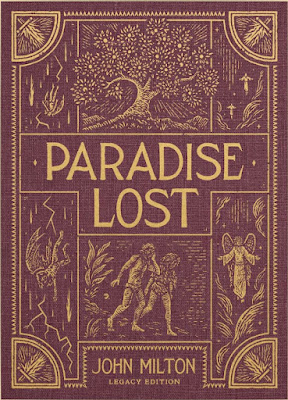As they forewarne,
Wolves shall succeed for teachers, grievous Wolves,
Who all the sacred mysteries of Heav’n
To thir own vile advantages shall turne,
Of lucre and ambition, and the truth
With superstitions and traditions taint,
Left onely in those written Records pure,
Though not but by the Spirit understood.
Then shall they seek to avail themselves of names,
Places and titles, and with these to joine
Secular power, though feigning still to act
By spiritual, to themselves appropriating
The Spirit of God, promisd alike and giv’n
To all Beleevers; and from that pretense,
Spiritual Lawes by carnal power shall force
On every conscience; Laws which none shall finde
Left them inrould, or what the Spirit within
Shall on the heart engrave. What will they then
But force the Spirit of Grace it self, and binde
His consort Libertie; what, but unbuild
His living Temples, built by Faith to stand,
Thir own Faith not anothers: for on Earth
Who against Faith and Conscience can be heard
Infallible? yet many will presume:
Whence heavie persecution shall arise
On all who in the worship persevere
Of Spirit and Truth; the rest, farr greater part,
Well deem in outward Rites and specious formes
Religion satisfi’d; Truth shall retire
Bestuck with slandrous darts, and works of Faith
Rarely be found: so shall the World goe on,
To good malignant, to bad men benigne,
Under her own waight groaning till the day
Appeer of respiration to the just,
(from Book 12 of the poem)
My first encounter with Milton’s epic poem was in high school. Mrs. Corey taught a class called British Literature. Although I liked the class at the time, I have come to appreciate it and the exposure it gave me to the material more and more after high school.
I shouldn’t place this in writing, but I still have a library book of Milton’s works in my possession that was due back on July 07, 1988. I’ve heard horror stories of library fines running into the thousands of dollars, so it just remains part of my library and I choose to live a life on the run.
I have attempted to read the poem in its entirety many times, but it is a very difficult read. But that difficulty is what appealed to me in high school. Being dyslexic, but not aware of it in high school, reading any book had always been difficult. I was slow at the chore, required to read a sentence several times, slowing down more on each subsequent pass, before my brain found the word it was misinterpreting so I could focus on it, convert it to the correct word, and read the sentence once again so it finally made sense.
In British Literature class (referred to as British Lit by those in the know), we read excerpts from Beowulf, Shakespeare, and Milton, among others. Reading these was difficult for everyone. Everyone had to slow down and really analyze the words on the page, even get help with some words, which made me feel normal.
YouTube content creator and coffee roaster, Rob Pirie, has decided to read through a series of books, compiled as a collection called The Harvard Classics, of which Paradise Lost is included, and to provide commentary on the materials as well as his understanding of them. Paradise Lost is considered an epic poem and spans 12 chapters (or “books”). Rob produced 6 videos, covering 2 books per video, of his venture through Milton’s masterpiece. I have very much enjoyed his analysis of the story and plan to give a concerted effort towards reading the books of The Harvard Classics as well. I was able to purchase the complete collection of books in Amazon’s Kindle store for $1.99 (a price that eliminates any excuse not to gain exposure to some of the most influential books ever written).
I highly recommend watching Rob’s videos on Paradise Lost and his other videos as well. I look forward to joining him on his intellectual journey and trying some of the coffee he roasts.
